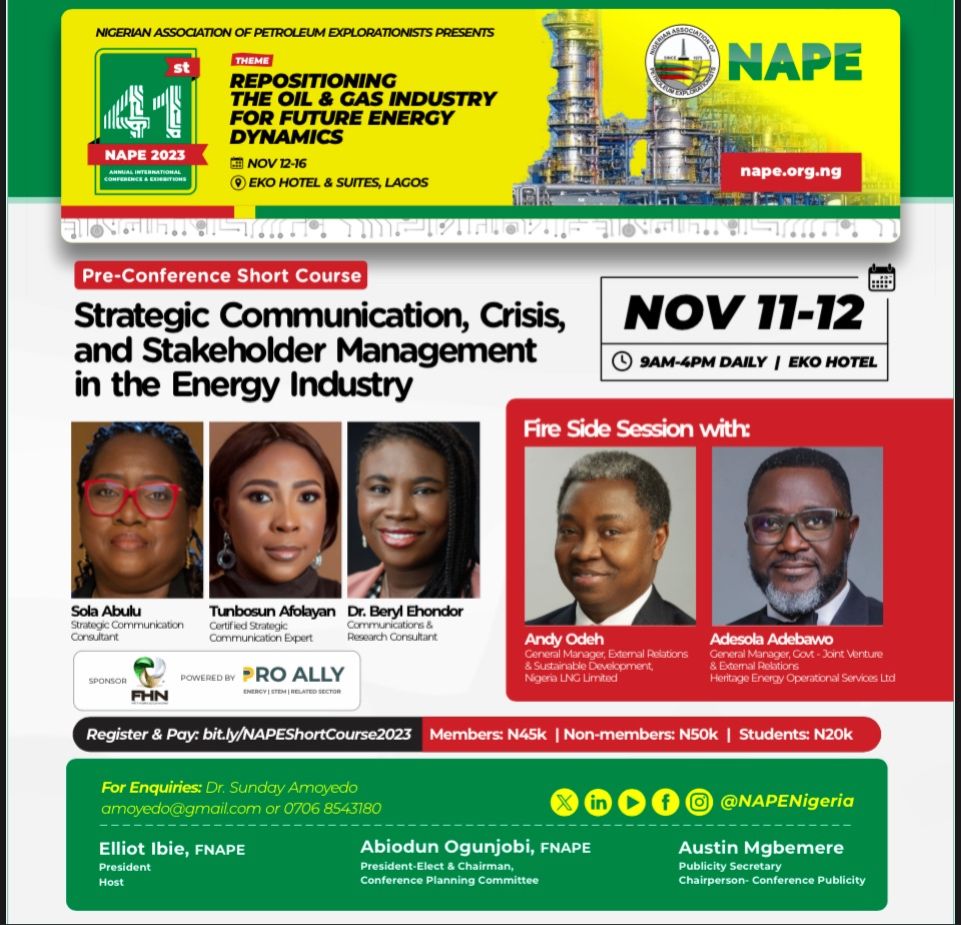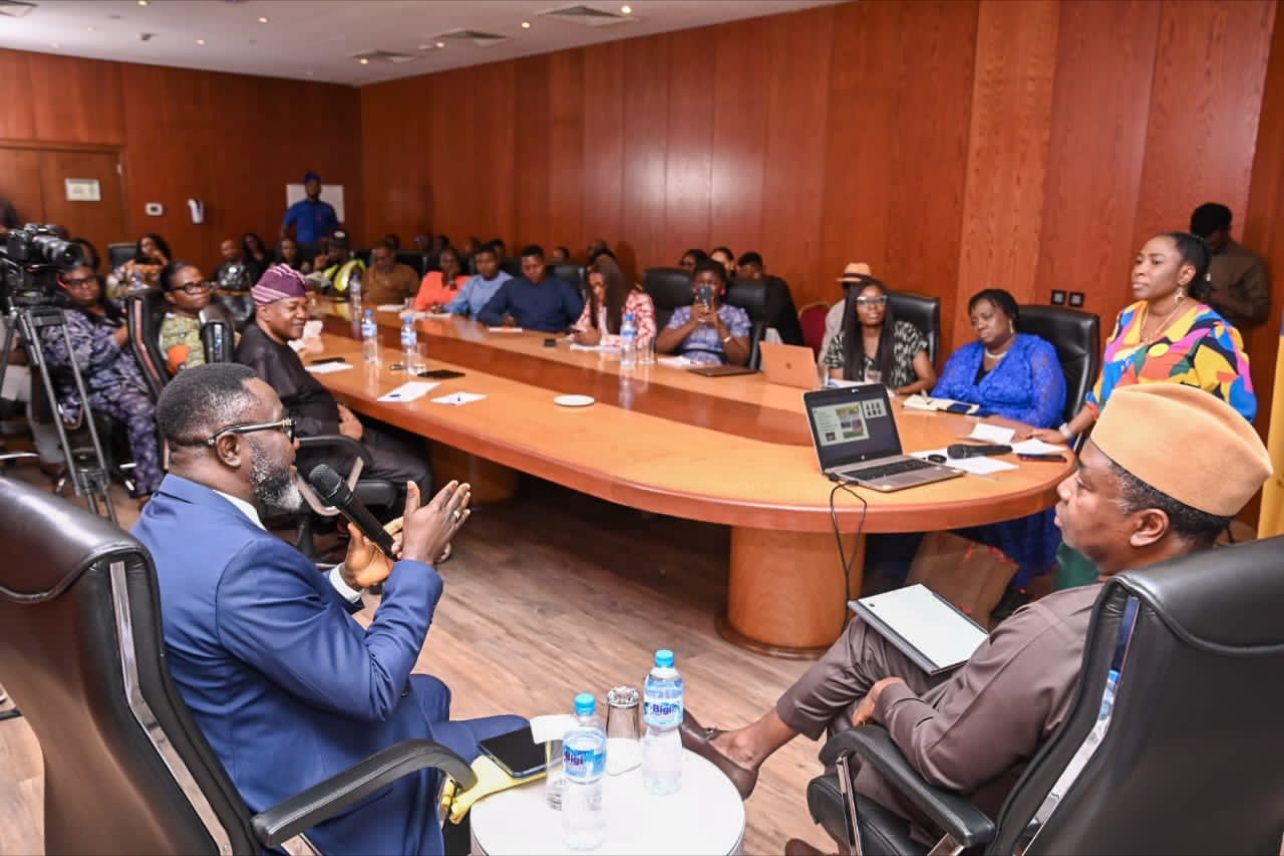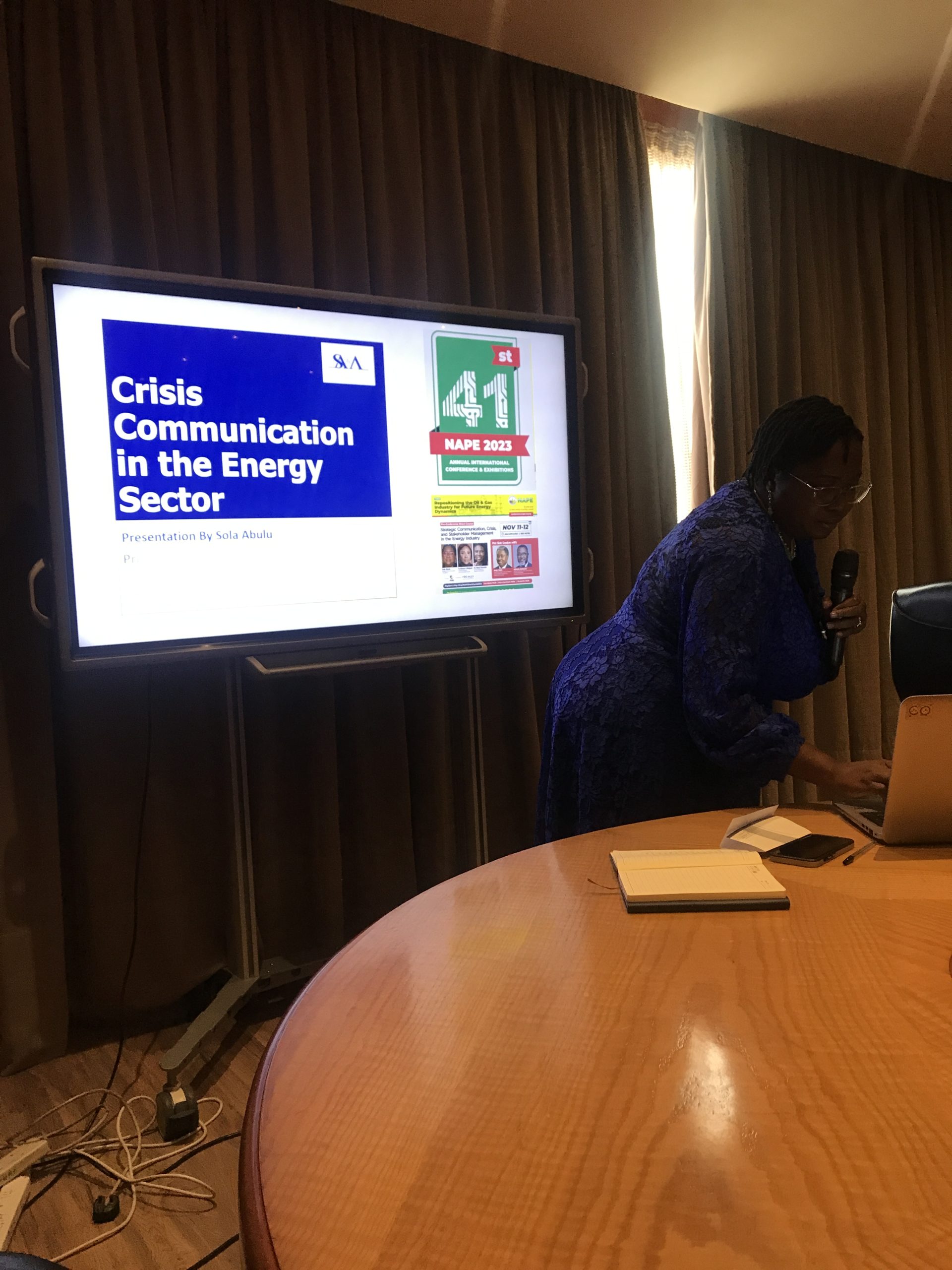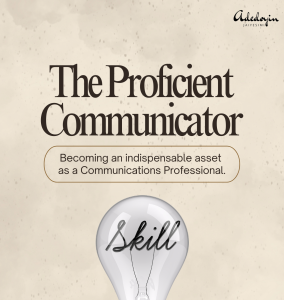When I saw the post about the NAPE Short Course on Strategic Communications, Crisis and Stakeholder Management in the Energy Industry in Nigeria, I just knew I had to be there. Put together by Pro Ally, this course was part of the pre-conference activities for the 41st Annual Conference of the Nigerian Association of Petroleum Explorationists (NAPE).

Aside from interacting with the stellar line up of faciliators and speakers, I was particularly curious to learn how the universal Communications principles apply within the Energy industry and the challenges that Communications professionals can position themselves to contribute a solution to.
Needless to say, I had great expectations for the Course and those expectations were met and exceeded too. These are some of my top musings and reflections from the Course:

Any Business That Wants to Remain Relevant Should Prioritise Communications
When I entered the room on the first day of the Course, I expected to see a lot of Communications professionals. You can imagine how surprised I was to see that the room had more of technical leaders and CEOs/ business leaders. This diverse mix of participants made the conversations an enriching one but it also became really clear that Communications is key to the success of any organisation.
In fact, this is what Mr Adesola Adebawo said during the fireside conversation on Day Two, “It is risky for any organisation not to have a Comms team that has a seat at the decision-making table.” This is true for the Energy industry and every other industry.
Any organisation this isn’t taking Communications seriously is not a very forward-thinking one. I’m looking forward to seeing more organisations giving their Communications teams the necessary support and leadership backing that they require because if your senior leaders do not get the need for Communications, you will struggle in your role.

The Nigerian Energy Sector Needs to Tell Its Story Differently
This is not my first time interacting with stakeholders in the Nigerian Energy industry. Last year, I facilitated a five-day training for mid-level managers at the Nigerian Midstream and Downstream Petroleum Regulatory Authority (NMDPRA) which allowed me to learn a lot about the industry.
Listening to Tunbosun Afolayan, Sola Abula, Andy Odeh and Adesola Adebawo, it became evident that organisations in the Energy industry are lagging behind in how they tell their story and as an industry, more can be done to shape the narrative about the Energy industry. Of course, this is where Communications comes in. As Dr Beryl Ehondor PhD said, “What story do we want to tell? How can we tell more human centric stories?”
These are questions that organisations in the Energy industry need to ask and answer urgently.

More Than Ever, Comms Professionals Need to Thoroughly Understand The Inner Workings of Their Organisations
Day one of the Course started with a session facilitated by Tunbosun Afolayan, Co-Founder of Pro Ally, where she broke down the business of organisations in the Energy industry. I had so many light bulb moments as she went through the value chain within the Energy industry and when and how financial value is achieved.
This is really powerful information for a Communications professional to have. When you truly understand the inner workings of your organisation, you will spot unique opportunities to leverage Communications to add value to your organisation and solve business problems.
As I listened to different facililitators, it also occured to me how Communications can be leveraged to provide management with important data to drive critical business decisions. Honestly, the Communications function is a powerful one and I’d like to encourage every Communications professional to think bigger and more strategically. The work you do is super important!
PS – Can I just add here that this is again another opportunity for Communications professionals to specialise and provide value to different sectors of the economy.

It is Critical to Deliver Tangible Results Through Your Activities and Strategies
Filipe Pereira, the Managing Director of CARMA took a session on Communication Measurement and it was truly eye opening. I love something Filipe said, “Communications can only be relevant if it can be a tool for management to make key decisions.” You can only achieve this when the work you do aligns with the objectives of your organisation and you deliver tangible results.
If you’ve watched my bite-sized Comms Course on Strategic Communications, you already know this is something I emphasize. I am tired of listening to organisations refer to Communications as a cost center but in some ways, they are able to make such statements because we are yet to show how valuable Communications is within the organisation.
Like Filipe mentioned, the outputs and outcomes of your Communications activities need to correlate with the core goals of your organisation.
For Your Professional Growth, Expand Your Horizon
While the room where the Course took place was super packed, I silently wished more Communications professionals had taken advantage of the opportunity to learn and increase their knowledge.
Although this was a paid course, the value we received was at least 10 times more than what we paid. Yes, it’s true the Course was focused on the Energy industry but there were so many learning points that can be applied to any industry.
Whenever I see a learning opportunity, I jump on it. When it comes to your professional growth, please do not limit yourself. If you see reputable Communications thought leaders coming together to share what they know, find a way to be part of it. That approach to soaking up as much knowledge as you possibly can will help your career development. Let’s not talk about the networking opportunities that come with in person trainings!

PS – One of the facilitators, Sola Abulu, who did a fantastic session on Crisis Communications, is having a virtual course on Strategic Communications this month. I’d like to encourage you to sign up. Ms Abulu is a loaded professional with decades of experience.
I have to commend the executives of NAPE for providing the platform for this Course to be implemented. It was two days well spent learning from the faciliators and the speakers. I do hope we will see more of this in other sectors not just in Nigeria but across the African continent.




5 Responses
Many thanks for sharing what you learned.
Thank you, Priscilla!